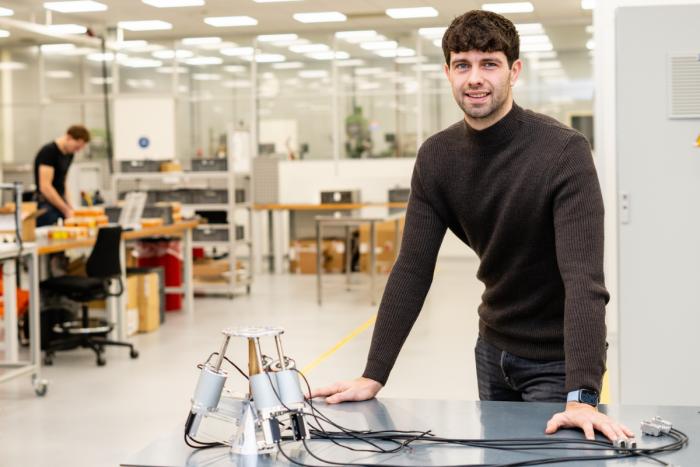Since January 2023, Tim has been working as an R&D Engineer at IMS. He feels at home in the Almelo-based company. “I learn a lot here and have the opportunity to expand my knowledge in precision engineering. With a background in mechanical engineering, I enjoy working with my hands. Assembling parts myself and seeing how the individual components work together is fascinating. Since IMS handles both development and assembly, testing, and debugging under one roof, we can achieve great results as a team of developers, builders, and testers. I have learned a lot from this.”
IMS has always been close to Tim. Between his internship and joining the company, he maintained close contact. As a researcher at the University of Twente, he even worked on a project commissioned by IMS. “Over the past few years, I have been involved in developing a hexapod, a six-legged robot for manipulating objects on a micrometre scale. This is used for highly precise applications. During my internship at IMS, we noticed issues with existing industrially manufactured systems. They were prone to wear and tear, reducing lifespan and accuracy.”
For his graduation project, Tim investigated the possibility of creating an improved version of such a robot. He did this at the Precision Engineering department of the UT, commissioned by IMS. “After the graduation project showed potential for such a hexapod, we decided to build a demonstrator through a follow-up study - an Engineering Doctorate,” says Tim. “What’s great about our developed system is that it’s entirely based on leaf springs. Leaf springs execute movements based on elastic deformation, resulting in a much longer lifespan. Using these elements in combination with a self-developed electric motor allowed us to develop a system that is not subject to mechanical wear and tear. This maintains accuracy even after frequent use.

The prototype developed by Tim and his colleagues has a joint patent between UT and IMS. Now, the enthusiastic R&D Engineer has moved on to the next innovation: a test platform for photonic instruments. “Many devices contain electronic chips based on electrical control signals. However, we are reaching the limits of these chips in terms of integration, heat generation, speed, and energy consumption. That’s why photonic components are increasingly used on chips. These components offer possibilities for increasing data transfer capacity and speeds. The only downside is that there are no test instruments for them. Everything must be done manually, which is very time-consuming.”
Therefore, IMS’s R&D department is building two machines to test the chips. “There’s market demand for it. One of the machines - the Helios - visually inspects the wafer with chips, while the other - the Sirius - performs electronic and optical inspection. Currently, I’m involved in the demonstration phase, where we’re building and validating the first version of the machine. The knowledge and experience we gain will be used as input for next year when we build the alpha and beta machines.”
Tim is excited about such innovations. Technological advancements are happening rapidly. He enjoys contributing to that. “Many futuristic things you saw in movies like Back to the Future can now be developed. Being part of the community involved in that is fantastic. Contributing to the world of the future in that way is very fulfilling.
IMS is a machine builder active in the field of optics and sensors. This sector demands extremely precise product assembly, and for that, versatile and advanced equipment is required.
Date: 11 January 2024 |
Source of tekst: Source |
Author: Willem Korenromp







